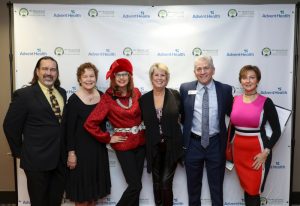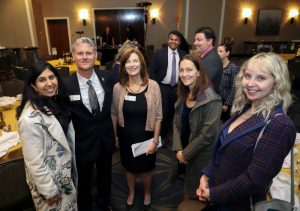Spreading Hope
Before joining The Mustard Seed of Central Florida as its executive director in 2013, Kathy Baldwin had heard inspiring stories about how the nonprofit furniture and clothing bank can dramatically change the lives of local families in need. She remembers quite vividly one of the first times she actually got to witness that impact firsthand. It all started with a scream.
Baldwin was sitting at the organization’s headquarters early in her tenure when she heard some commotion coming from the warehouse area, and her first instinct was to run toward the sound to help whoever was in trouble. When she got there, she soon realized that nobody was in danger and the noises were actually shrieks of happiness.
“It ended up being a foster care individual who was 18 years old, aged out of foster care, and she was choosing her own items for the very first time in her life,” Baldwin recalls. “She just happened to get that excited that she was jumping up and down with joy and screaming. Those are some of the things that come about because of what our services provide.”
 The only nonprofit of its kind in the area, The Mustard Seed helps economically qualifying families and individuals furnish their entire home with everything from sofas, beds and appliances to linens, sheets, dishes, silverware, toys and home décor. There is also a boutique and community shop on the premises—open to the public—offering great deals on clothes and shoes for people of all ages, along with books, antiques, holiday decorations and more.
The only nonprofit of its kind in the area, The Mustard Seed helps economically qualifying families and individuals furnish their entire home with everything from sofas, beds and appliances to linens, sheets, dishes, silverware, toys and home décor. There is also a boutique and community shop on the premises—open to the public—offering great deals on clothes and shoes for people of all ages, along with books, antiques, holiday decorations and more.
The Mustard Seed got its start in 1984 because of the generosity of founder Carol Kane. As Baldwin explains, the garage at Kane’s home was open one day when a family walking past noticed some old furniture sitting inside. They eventually got the courage to knock on her door and ask if anyone was using it, because they had just moved into an apartment but did not have the money to pay for beds or a kitchen table. Kane was happy to help them by donating whatever she had, and it did not take long for her to realize more and more people in the area could benefit in the same way.
“This was something in the community that was not being served, so with help from friends, family and her church she started the 501(c)(3) and named it The Mustard Seed because of her faith,” Baldwin says. “The Mustard Seed is a parable in the Bible that reads, ‘If you have faith even as small as a mustard seed, you can say to the mountains to move and they will move.’ There’s hope, that’s the whole premise of that parable. So that’s where The Mustard Seed name came from.”
The Mustard Seed originally operated out of Kane’s garage before moving to a storage facility, then a warehouse, and finally the 20,000-square-facility it calls home today, which was built in 2000. Kane retired around 2008 but still lives in The Villages and keeps in touch with Baldwin and her staff.
Baldwin came from a nonprofit background, having co-founded The Gift of Swimming, an organization that aims to reduce drowning accidents by teaching children, the underprivileged and those with mental or physical disabilities how to swim. She also spent many years working for The United Way before filling a leadership void at The Mustard Seed.
“The brand was there,” she says. “It was a little bit in disarray physically and fiscally, but I took it as a challenge that if I could start a nonprofit, I could pull this one up by its boot straps. Sure enough, we’re in an excellent position of growth right now.”
The Mustard Seed has agreements with nearly 200 different agencies—including the Florida Department of Children and Families, other nonprofits, health care systems and schools—which send referrals for people who are in need of its services. After an extensive vetting process, clients will have an in-person or virtual home visit with a case manager to review their space, and then fill out forms detailing who will be living in the home and what items are needed.
They then make an appointment to visit the warehouse with their checklist and pick out everything they need. There is a fee of $150 that is either paid by the family or the organization that referred them, and they must also rent a truck and be able to load the items. If they are not able to do so, they can pay an additional $150 to have delivery services provided.
Common groups that The Mustard Seed serves are those transitioning out of homelessness, a substance abuse program or incarceration, as well as victims of domestic violence, medical hardships, fires or natural disasters.
“I can go on and on with all of the reasons,” Baldwin says. “During a time of economic downfall there was an executive who lost his job, then his family and his home, and he was living in his car and had to start all over again. It can happen to anyone.”
Ashley Baily and her husband found out about The Mustard Seed from her close friend, Alex Shanahan, who works as the office coordinator for the nonprofit. When they were moving into a new home in Apopka with their three children and were unsure how they were going to furnish it, the organization was a godsend.
“At our previous home, the furniture was already there; it came with the place we rented,” Baily says. “When we moved out of there, we needed everything. It was pretty much a clean slate, starting over. We were just going to look on Facebook Market and stuff like that, but Alex told us about the program they have and what you have to do to sign up for it. They came out, looked at what we needed and got us set up from there. It was actually really easy and really quick. It doesn’t take a bunch of hoops that you have to jump through.”
Baily and her husband scheduled a day to visit the warehouse, and they were able to choose from the inventory of couches, dining room tables, TV stands and more. “When we were moving into our house, I was about to have my third son, so they actually donated a brand-new crib still in the box and they gave us a mattress for it,” she says. “They give you sheets, tableware—all kinds of stuff.”
She has also taken advantage of the clothing boutique and raves about the staff and how courteous and friendly they are. A voucher costs $5 for children, $7 for seniors and $12 for adults, and comes with three complete outfits including shoes, purses, backpacks and belts. Customers are allowed two vouchers per month.
“They have a really decent selection,” Baily says. “Some of the more common sizes sell out fast, but as long as they have stuff in we can usually find just about everything we need. Having boys, they grow out of stuff so quickly, so whatever I get from [The Mustard Seed] definitely helps when they hit that random growth spurt and we just don’t have clothes for them to size into.”
In order for both the furniture and clothing programs to remain successful and offer discounted items for those in need, The Mustard Seed has gotten creative from a financial standpoint, Baldwin says. In addition to fundraising throughout the year from corporations and individuals, the nonprofit puts on special events like the inaugural Raise the Table, a successful venture held in November that brought in close to 200 guests for a silent auction and comedy night.
The organization also has a robust recycling program that helps generate revenue, in particular in regard to mattresses. For every 100 mattresses donated from companies like Disney and Original Mattress Factory, only 30 can be reused for clients, but since 2011 The Mustard Seed has deconstructed 160,000 mattresses. Not only does that convert to diverting four million cubic feet of waste from the landfill, but it allows for the metal and foam to be recycled, generating needed funds to support the mission.
“It is quite an operation—it costs about $60,000 a month to run,” Baldwin says. “So we try not to have one source of revenue; we want to make sure we have a diverse source of revenue so we can maintain that month to month. Any donations at any time, any amount, are always accepted and acknowledged as well.”
Volunteers are welcome to assist the small staff of 14, and Baldwin says that corporations find it rewarding to do team-building events where employees come by the warehouse to load furniture, hang clothing or deconstruct mattresses. All of these efforts add up to The Mustard Seed helping about 3,000 local residents a year—people like Baily who have been moved by the nonprofit’s generosity.
“When I see somebody who can benefit, I do tell them about The Mustard Seed,” she says. “If you find a program that works and is willing to help people—because nowadays they’re hard to find—you might as well spread the word to somebody who can actually use the program. We wouldn’t have had anything if they didn’t help us out.”









